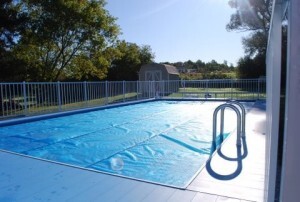Pool covers are necessary to protect your investment between swim seasons. However, some are appropriate for summer as well and are designed to help raise the temperature of the water so you can open your pool earlier. When considering the many types of pool covers, choose the one that best meets your needs.
Mesh Covers
Mesh covers are a low-maintenance option. They’re light and easy to remove from your pool at any time. If you want to inspect your pool before swim season begins, you can simply lift and set  aside a mesh cover. You don’t have to pull and tug as you do with some solid covers. Additionally, mesh covers allow snow and rain water to seep through during the off season. There’s no need to pump water from the cover when it rains. You won’t need to sweep leaves and debris from a mesh cover either; the wind blows them away.
aside a mesh cover. You don’t have to pull and tug as you do with some solid covers. Additionally, mesh covers allow snow and rain water to seep through during the off season. There’s no need to pump water from the cover when it rains. You won’t need to sweep leaves and debris from a mesh cover either; the wind blows them away.
The biggest drawback of a mesh cover is the dirty water that accumulates from winter precipitation during the off season. Leaves and debris may seep into the pool as well, making it harder to clean. With a mesh cover, you’ll spend extra time at the beginning of swim season cleaning your pool and draining stagnant water from beneath the cover with a pump.
Solid Covers
In contrast, solid covers keep your pool water clean throughout the winter. As long as you follow correct pool closing procedures, you’ll never have to worry about seeing a green pool at the beginning of swim season. Your water will be clear, and debris particles will not settle at the bottom of the pool as they sometimes do with a mesh cover.
Solid covers are much heavier than mesh ones, and you must drain water from the cover periodically during winter. There are automatic cover pumps for this purpose, but some pool owners find this too much extra work.
Hybrid Covers
If you can’t decide between a mesh and solid, a hybrid cover may be for you. Consider a double mesh cover that keeps out debris and groundwater or an extra tight solid cover that doesn’t require constant pumping.
